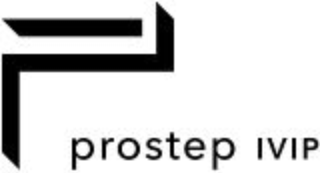
Computer-aided design (CAD) is the use of computers to aid in the creation, modification, analysis, or optimization of a design. This software is used to increase the productivity of the designer, improve the quality of design, improve communications through documentation, and to create a database for manufacturing. Designs made through CAD software help protect products and inventions when used in patent applications. CAD output is often in the form of electronic files for print, machining, or other manufacturing operations. The terms computer-aided drafting (CAD) and computer-aided design and drafting (CADD) are also used.

Interoperability is a characteristic of a product or system to work with other products or systems. While the term was initially defined for information technology or systems engineering services to allow for information exchange, a broader definition takes into account social, political, and organizational factors that impact system-to-system performance.
An open standard is a standard that is openly accessible and usable by anyone. It is also a common prerequisite that open standards use an open license that provides for extensibility. Typically, anybody can participate in their development due to their inherently open nature. There is no single definition, and interpretations vary with usage. Examples of open standards include the GSM, 4G, and 5G standards that allow most modern mobile phones to work world-wide.
Message-oriented middleware (MOM) is software or hardware infrastructure supporting sending and receiving messages between distributed systems. Message-oriented middleware is in contrast to streaming-oriented middleware where data is communicated as a sequence of bytes with no explicit message boundaries. Note that streaming protocols are almost always built above protocols using discrete messages such as frames (Ethernet), datagrams (UDP), packets (IP), cells (ATM), et al.

PTC Inc. is an American computer software and services company founded in 1985 and headquartered in Boston, Massachusetts. The company was a pioneer in parametric, associative feature-based, solid computer-aided design (CAD) modeling software in 1988, including an Internet-based product for Product Lifecycle Management (PLM) in 1998. PTC markets products and services and an Internet of Things (IoT) and augmented reality (AR) platform for partners and developers.

Unified Extensible Firmware Interface is a specification for the firmware architecture of a computing platform. When a computer is powered on, the UEFI-implementation is typically the first that runs, before starting the operating system. Examples include AMI Aptio, Phoenix SecureCore, TianoCore EDK II, InsydeH2O.
OMA SpecWorks, previously the Open Mobile Alliance (OMA), is a standards organization which develops open, international technical standards for the mobile phone industry. It is a nonprofit Non-governmental organization (NGO), not a formal government-sponsored standards organization as is the International Telecommunication Union (ITU): a forum for industry stakeholders to agree on common specifications for products and services.
The Data Distribution Service (DDS) for real-time systems is an Object Management Group (OMG) machine-to-machine standard that aims to enable dependable, high-performance, interoperable, real-time, scalable data exchanges using a publish–subscribe pattern.
CAD data exchange is a method of drawing data exchange used to translate between different computer-aided design (CAD) authoring systems or between CAD and other downstream CAx systems.
Pro/DESKTOP is a discontinued computer-aided design (CAD) program from Parametric Technology Corporation (PTC), that allowed users to design and model in 3D and create 2D drawings. It can transfer a 3D design into a 2D engineering drawing format and also create photo-realistic views using Album Views. It is part-compatible with Pro/ENGINEER, and uses the Granite kernel, but otherwise is a freestanding CAD system.
Knowledge Discovery Metamodel (KDM) is a publicly available specification from the Object Management Group (OMG). KDM is a common intermediate representation for existing software systems and their operating environments, that defines common metadata required for deep semantic integration of Application Lifecycle Management tools. KDM was designed as the OMG's foundation for software modernization, IT portfolio management and software assurance. KDM uses OMG's Meta-Object Facility to define an XMI interchange format between tools that work with existing software as well as an abstract interface (API) for the next-generation assurance and modernization tools. KDM standardizes existing approaches to knowledge discovery in software engineering artifacts, also known as software mining.
The United States Department of Defense (DoD) Internet Protocol version 6 (IPv6) product certification program began as a mandate from the DoD's Assistant Secretary of Defense for Networks & Information Integration (ASD-NII) in 2005. The program mandates the Joint Interoperability Test Command (JITC) in Fort Huachuca, Arizona, to test and certify IT products for IPv6 capability according to the RFCs outlined in the DoD's IPv6 Standards Profiles for IPv6 Capable Products. Once products are certified for special interoperability, they are added to the DoD's Unified Capabilities Approved Products List for IPv6. This list is used by procurement offices in the DoD and the U.S. Federal agencies for ongoing purchases and acquisitions of IT equipment.

The Open Cloud Computing Interface (OCCI) is a set of specifications delivered through the Open Grid Forum, for cloud computing service providers. OCCI has a set of implementations that act as proofs of concept. It builds upon World Wide Web fundamentals by using the Representational State Transfer (REST) approach for interacting with services.
The open metering system of the Open Metering System Group e.V. stands for a manufacturer- and media-independent standardization for Meter-Bus (M-Bus) based communication between utility meters, submetering, and systems in the field of smart meters.

The ENX Association is an organization comprising European vehicle manufacturers, suppliers, and related organizations.
Cloud Infrastructure Management Interface (CIMI) is an open standard API specification for managing cloud infrastructure.
Thread is an IPv6-based, low-power mesh networking technology for Internet of things (IoT) products. The Thread protocol specification is available at no cost; however, this requires agreement and continued adherence to an end-user license agreement (EULA), which states "Membership in Thread Group is necessary to implement, practice, and ship Thread technology and Thread Group specifications."

pr is an association with its headquarters in Darmstadt, Germany. Founded in 1993 as the ProSTEP Association for the Promotion of Product Data Standards and later renamed to ProSTEP iViP Association in 2002, and since May 2017 the association's name has been written as "prostep ivip". Prostep ivip is a globally active, independent association of 180 member companies from industry, IT and research. It is an industry-driven association and its main focuses are on the digital transformation in product creation and production. By designing digital transformation in the manufacturing industry prostep ivip defines and aggregates the requirements of manufacturers and suppliers, intending to define standards and interfaces primarily for the digitalization of the entire product creation process – from idea to implementation.

ISO 15118Road vehicles -- Vehicle to grid communication interface is a proposed international standard defining a vehicle to grid (V2G) communication interface for bi-directional charging/discharging of electric vehicles. The standard provides multiple use cases like secure communication, smart charging and the Plug & Charge feature used by some electric vehicle networks.
The DIN standard DIN 91379: "Characters and defined character sequences in Unicode for the electronic processing of names and data exchange in Europe, with CD-ROM" defines a normative subset of Unicode Latin characters, sequences of base characters and diacritic signs, and special characters for use in names of persons, legal entities, products, addresses etc. The standard defines a normative mapping of Latin letters to base letters A-Z as an extension of the recommendations of ICAO.








